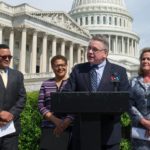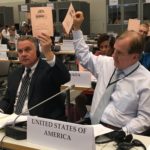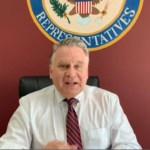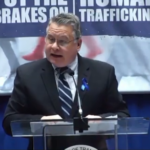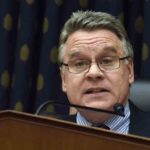Int’l Assembly Adopts Smith Resolution to Educate Children on Human Trafficking Threat
1 in 4 Trafficking Victims Are Children
Teaching children to recognize, resist and report any attempt to recruit or coerce them into human trafficking
WASHINGTON, DC—An international parliamentary assembly of leading lawmakers from 54 countries today unanimously adopted an anti-human trafficking initiative authored by U.S. Rep. Chris Smith (R-New Jersey) to further protect children by teaching them about the risks of human trafficking.
Smith offered his “Educating Schoolchildren to Avoid Human Trafficking” resolution at the 28th Annual Session of the Organization for Security and Cooperation in Europe Parliamentary Assembly (OSCEPA) held in Luxemburg July 4-9th and attended by more than 250 international, voting lawmakers including a bipartisan delegation of 17 representing the United States.
The age-appropriate education strategy called for in Smith’s resolution is modeled after a critical component of a his most recent U.S. anti-human trafficking law—The Frederick Douglass Trafficking Victims Prevention and Protection Act —signed by the President in January 2019. Named after Frederick Douglass, the former slave who became a great abolitionist, this is Smith’s fifth comprehensive anti-human trafficking law, which among other things, ensures that school-aged children are educated in the classroom to recognize, resist and report any attempt to recruit or coerce them into the cruel world of human trafficking—the modern day slavery.
The congressman worked with abolitionist Frederick Douglass’ great, great, great grandson Kenneth Morris (PICTURED to right of Rep. Smith) to write the new American anti-human trafficking law. And Morris was on hand at the OSCE-PA session, the featured 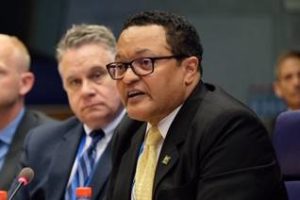 speaker at a July 6th forum hosted by Smith at the European Convention Center, to urge the other participating states to get on board with the American proposal.
speaker at a July 6th forum hosted by Smith at the European Convention Center, to urge the other participating states to get on board with the American proposal.
“The need for educating the children and training school officials in each of our countries is compelling,” said Smith, the OSCEPA Special Representative on Human Trafficking. “According to the International Labor Organization (ILO) 1 in 4 trafficking victims are children.”
“As the Parliamentary Assembly’s Special Representative on Human Trafficking, I’ve offered 20 resolutions over the years which the PA approved—each focusing on new and effective strategies to be merged with each nation’s ongoing work,” he said. “Today, I am respectfully asking you to consider creating another life-saving policy initiative—if you haven’t done so already—to educate schoolchildren to avoid human trafficking.” Click here to read Smith’s remarks to the assembly.
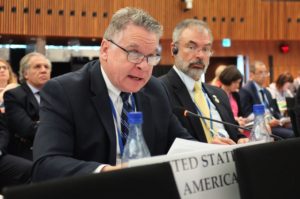 Smith has a long history of advocating against human trafficking. Twenty years ago at the 1999 OSCE Parliamentary Assembly in St. Petersburg, Smith sponsored the first human trafficking supplementary resolution designed to encourage all participating states to develop policies to prevent trafficking in all of its ugly manifestations; rescue and protect victims; and prosecute, convict and jail traffickers. A year later the U.S. Congress approved and the President signed Smith’s landmarkTrafficking Victims Protection Act of 2000—a comprehensive policy to combat these barbaric crimes in the United States and around the world. Pursuant to that law, on June 20th, U.S. Secretary of State Michael Pompeo released the 2019 Trafficking in Persons (TIP) Report—a global analysis and ranking of every country in the world, including the U.S.
Smith has a long history of advocating against human trafficking. Twenty years ago at the 1999 OSCE Parliamentary Assembly in St. Petersburg, Smith sponsored the first human trafficking supplementary resolution designed to encourage all participating states to develop policies to prevent trafficking in all of its ugly manifestations; rescue and protect victims; and prosecute, convict and jail traffickers. A year later the U.S. Congress approved and the President signed Smith’s landmarkTrafficking Victims Protection Act of 2000—a comprehensive policy to combat these barbaric crimes in the United States and around the world. Pursuant to that law, on June 20th, U.S. Secretary of State Michael Pompeo released the 2019 Trafficking in Persons (TIP) Report—a global analysis and ranking of every country in the world, including the U.S.
Title I of the US Frederick Douglass Act authorizes the U.S. government to provide grants to local education agencies in partnership with NGOs to establish, expand and support programs:
- to provide age-appropriate information to students on how to avoid becoming victims of sex and labor trafficking;
- to educate school staff to recognize and respond to signs of sex and labor trafficking.
“Women and girls are disproportionately affected by forced labor, account for 99 percent of victims in the commercial sex industry, and 58 percent in other sectors,” Smith said. “Traffickers exploit children due to their lack of awareness about the threat, and a child’s vulnerability can be compounded by poverty, a previous history of abuse and neglect, institutionalization, running away from home, being an unaccompanied minor, disability, belonging to a minority group, lacking citizenship or birth registration, being an asylum seeker, refugee or internally displace persons (IDP).”
“Today as never before, traffickers are using internet communication technologies (ICTs) to lure children into trafficking,” Smith said. “According to a National Center for Missing and Exploited Children study the average age of online enticement that can result in being trafficked was 15.”
A number of NGOs have developed school courses including the Frederick Douglass Family Initiatives Project, A21, Just Ask, and the National Center for Missing and Exploited Children.
Smith’s resolution asks OSCE member countries to:
- initiate prevention education for children and teachers and where feasible integrate courses of instruction into other courses;
- collaborate with school districts, law enforcement, child and family welfare agencies, faith communities, shelters for runaway and homeless youth and anti-human trafficking NGOs;
- develop a protocol for responding to child victims;
- pay particular attention to preventing traffickers’ abuse of internet communication technologies (ITCs) by offering comprehensive and ongoing education to children to avoid high-risk behaviors online.
“Each of us, I believe, can and must do a better job protecting the weakest and most vulnerable from exploitation,” Smith said. “The need to educate the children on human trafficking and how to avoid it is absolutely compelling.”
Smith has served as an active member of the OSCEPA, which facilitates inter-parliamentary dialogue among the participating States. He first became a member of the Commission in 1983, and chaired the U.S. Commission on Security and Cooperation in Europe (CSCE) in five previous Congresses.
As at 14 previous conferences, Smith as the Special Representative on Trafficking, writes and submits an annual report on human trafficking.
In addition to the Frederick Douglass Trafficking Victims Protection and Prevention Act, Smith has authored four other major U.S. laws to fight trafficking: the Trafficking Victims Protection Act (P.L. 106-386), the Trafficking Victims Protection Reauthorization Act (P.L. 108-193), theTrafficking Victims Protection Reauthorization Act of 2005 (P.L. 109-164) and the International Megan’s Law (P.L. 114-119). Smith is second in the House when it comes to successfully authoring bills that become law—46 in all.
Smith is second in the House when it come to successfully authoring bills that become law—46 in all. In addition to the Frederick Douglass Trafficking Victims Protection and Prevention Act, Smith has authored four other major U.S. laws to fight trafficking: the Trafficking Victims Protection Act (P.L. 106-386), the Trafficking Victims Protection Reauthorization Act (P.L. 108-193), the Trafficking Victims Protection Reauthorization Act of 2005 (P.L. 109-164) and the International Megan’s Law (P.L. 114-119).
The OSCE is an international organization that focuses on a wide range of security-related concerns, including arms control, confidence- and security-building measures, human rights, national minorities, democratization, policing strategies, counter-terrorism and economic and environmental activities. All participating States enjoy equal status.

